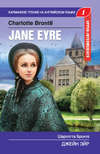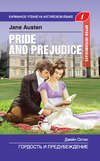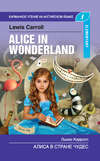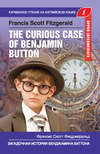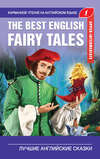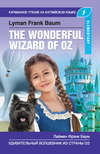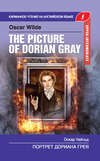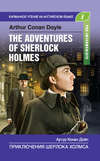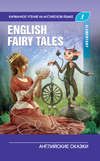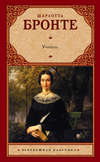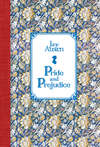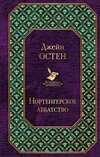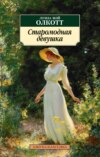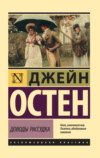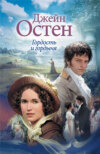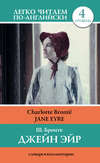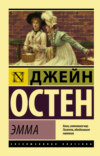Read the book: «Джейн Эйр / Jane Eyre», page 2
Chapter 3
After that day a change seemed near, I desired and waited it in silence. Mrs. Reed dropped no hint about sending me to school but I felt she would no longer endure me under the same roof. I ate my meals alone, and Mrs. Reed told John, Eliza and Georgiana not to speak to me. I spent more time with the servants than with the Reeds. Sometimes Bessie let me dust and tidy the rooms to keep me busy.
November, December, and half of January passed away. During all Christmas and New Year parties I waited in my room, listening to the sound of the piano, the clink of glasses and the hum of conversation below. Once or twice Bessie brought me a cake from the feast.
It was the fifteenth of January, about nine o’clock in the morning. Bessie came running into the nursery. “Miss Jane! What are you doing there?” she said. “Have you washed your hands and face this morning?” She hurried me up to the washstand, scrubbed my face and quickly brushed my hair. I was wanted downstairs.
I slowly descended and stopped in front of the breakfast-room door trembling. I feared to return to the nursery, and feared to go forward. Ten minutes I stood in hesitation till I finally decided: I MUST enter.
Mrs. Reed was in her usual seat bу the fireside, she made a signal to me to approach and introduced me to a tall grey-eyed gentleman with the words: “This is the little girl I wrote to you about.”
“She is so small. What is her age?” he said in a bass voice.
“Ten years.”
“So much? What is your name, little girl?”
“Jane Eyre, sir.”
“Well, Jane Eyre, are you a good child?”
It was impossible to answer. I thought I was good, but I knew no one else in the house would say so. I was silent. Mrs. Reed answered for me by shaking her head and adding: “The less said about that, the better.’’
“Sorry indeed to hear! She and I must talk. Come here.”
I came up to him. He placed me straight before him. What a face he had! What a great nose! And what a mouth!
“No sight so sad as that of a naughty child. Do you know where wicked people go, Jane, after they die?”
“They go to hell,” was my ready answer.
“Is that what you want to happen to you?”
“No, sir,” I said.
“What must you do to avoid it?”
I was at a loss. I knew I couldn’t try any harder to be good. “I must take care not to die, sir.”
“Do you say your prayers night and morning?”
“Yes, sir.”
“Do you read your Bible?” continued my interrogator.
“Sometimes.”
“Are you fond of it?”
“I like Revelations9, and the book of Daniel.”
“And the Psalms?”
“I don’t like them.”
“Oh, shocking! I know a little boy, younger than you, who knows six Psalms by heart. When asked what he would prefer, a nut or a Psalm to learn, he says, ‘Oh, the verse of a Psalm, please. Angels sing Psalms. I wish to be like a little angel.’ He then gets two nuts as a reward for his goodness.”
“Psalms are not interesting.”
“You must pray to God to change your wicked heart and give you a new and clean one.”
I wanted to ask him how when Mrs. Reed broke the silence.
“Mr. Brocklehurst,” she said. “If you admit her into Lowood school, I want the superintendent and teachers keep a strict eye on her. Deceit is, indeed, a sad fault in a child.” Uttered before a stranger, the accusation cut me to the heart.
“Deceit is, indeed, a sad fault in a child. She will be watched, Mrs. Reed. I will speak to Miss Temple and the teachers,” said Mr. Brocklehurst.
“I wish her to be made useful and humble. She will, with your permission, spend all vacations at Lowood.”
“I approve of your decisions, madam.”
“I will send her, then, as soon as possible, Mr. Brocklehurst.”
“I will send Miss Temple notice about a new girl, so that there will be no difficulty about receiving her. Good-bye.”
“Good-bye, Mr. Brocklehurst.”
Mrs. Reed and I were left alone: some minutes passed in silence; she was sewing, I was watching her with rage in my eyes. Mrs. Reed looked up from her work
“Return to the nursery,” she ordered with irritation. But first I wanted to talk with her.
“I am not deceitful,” I said. “If I were, I would lie and say I love you, and I declare I do not love you. I dislike you, and your son, and the girls. They tell lies, not me.”
“Have you anything more to add?” she asked coldly, as if she were speaking to an adult, not a child10. Her tone made me even more furious. Shaking from head to foot, I continued: “I am glad you are no relation of mine. I will never call you aunt again as long as I live. People think you a good woman, but you are bad, hard-hearted. YOU are deceitful!”
“‘Jane, you are under a mistake: what is the matter with you? I assure you, I desire to be your friend.”
“Not you. You told Mr. Brocklehurst I had a bad and deceitful character; and I’ll let everybody at Lowood know what you are, and what you have done. Send me to school soon, Mrs. Reed, for I hate to live here.”
“I will indeed send her to school soon,” murmured Mrs. Reed and left the room. I won.
“All at once I heard a clear voice call, ‘Miss Jane! where are you? Come to lunch!”
It was Bessie, I knew well enough, but I did not move. She came and her presence seemed cheerful. I put my two arms round her.
“You are going to school, I suppose?” she asked.
I nodded.
“And won’t you be sorry to leave poor Bessie?”
“Not at all, Bessie; indeed, I’m rather sorry.”
She laughed at my words and we embraced.
Chapter 4
At five o’clock in the morning Bessie came into my room to find me already up and dressed. She prepared breakfast for me, but few children can eat when excited with the thoughts of journey.
As we passed Mrs. Reed’s bedroom, she said, “Will you go in and bid Missis goodbye?” I just shook my head.
“Good-bye to Gateshead!” cried I, as we passed through the hall and went out at the front door.
The winter morning was raw and chill. At the lodge house, the porter’s wife was up; I could already hear the sound of the public coach coming towards us in the distance.
“Is she going by herself?” asked the porter’s wife.
“Yes, fifty miles, all on her own,” said Bessie.
The coach came into view, and the horses stopped. My trunk was taken from me and put up onto the roof. I embraced Bessie, and she kissed me on the cheek.
“Be sure to take good care of her!” said she, as I was put in the carriage and the wheels began to move. I was carried away to my new life.
I remember little of the journey. The day seemed too long took all day, we stopped at the inn once but I had no appetite. I was feeling very strange. We were getting very far from Gateshead, to a remote and mysterious place. The wind started to rush amongst trees; and lulled by the sound, I at last fell asleep.
I woke up when the carriage stopped. The door was opened, and I saw a servant standing in the rain.
“Is there a little girl called Jane Eyre here?” she asked. I said “yes”. The guard lifted me out, my trunk was put down, and seconds later the coach drove away.
I was exhausted after a long journey and chilled to the bone as rain, wind, and darkness filled the air. I could see a house or houses with many windows, and lights burning in some. The servant led me inside it and left me in a silent room by the fire.
As I looked round warming my fingers and trying to make out what was there in the room, two ladies came in. The first one was a tall lady with dark hair, dark eyes, a pale and large forehead, and a figure partly enveloped in a shawl11. She was about twenty-nine and looked a little older than the second lady who was, however, shorter, more ordinary, and hurried in gait and action.
“The child looks tired,” said the first lady. “She should be put to bed soon, Miss Miller. And she must be hungry. Let her have supper.” Then she addressed me, “Is this the first time you have left your parents to come to school, my little girl?”
“I have no parents.”
I told her my age, my name and whether I could read, write, and sew. She seemed pleased. She touched my cheek gently and dismissed me with Miss Miller.
Led by her, I passed from passage to passage till we entered a wide, long room, with great tables, two at each end, and girls of every age, from nine up to eighteen, sitting around them on benches. Countless and similar figures, they were whispering repetitions for tomorrow’s classes and their whispers grew into a hum of voices.
I was told to sit on a bench near the door, and Miss Miller walked up to the top of the long room.
“Monitors, collect the books and put them away! Then fetch the supper-trays!” Immediately four older girls, one from each table, got up, gathered the books, went out and returned, each carrying a tray with a pitcher of water, a mug and portions on them. The portions were handed round. Those who liked took the mug and poured water. I was thirsty, but did not touch the food as I was still too excited and tired to eat.
When the meal was over, Miss Miller read prayers, and the classes went upstairs, two by two. By now I was so exhausted, I hardly noticed what the bedroom was like, I only saw it was very long. I was helped to undress and put into bed. In ten minutes the light was switched off, and amidst complete silence and darkness I fell asleep.
Chapter 5
The night passed rapidly. When I opened my eyes, a loud bell was ringing and girls were up and dressing all around me. I too rose reluctantly. It was still dark and freezing cold in the bedroom. I dressed shivering and waited for my turn at the basin. But I had hardly begun to wash my face when the bell rang again. All formed in file, two and two, we descended the stairs and entered the cold and dimly lit schoolroom. After prayers Miss Miller told us to form classes.
There were four classes, and Miss Miller put me in the one with the smallest of the children. We said prayers and read from the Bible for an hour. As I had not eaten since my departure from Gateshead, I was now very hungry and looked forward to our breakfast.
At the sound of the breakfast bell, we formed into pairs again to go to the refectory, a gloomy room, furnished with two long tables. Basins of something steaming hot stood on every table though the odour was far from inviting. The tall girls at the front murmured that the porridge had been burnt again.
“Silence,” snapped one of the teachers, a short woman with a sour face. We took our places. A long grace was said and a hymn sung; then a servant brought in some tea for the teachers, and the meal began. I was so hungry that I swallowed several mouthfuls before the revolting, gluey taste of the burned porridge made me stop. I saw each girl taste her food and try in vain to swallow. Breakfast was over, and none had breakfasted. I was one of the last to go out, and in passing the tables, I saw one teacher take a basin of the porridge, taste it and call it ‘disgusting’.
We spent a quarter of an hour in a schoolroom, where mostly all conversations were held on the subject of the breakfast. A clock in the schoolroom struck nine. “Silence!” cried Miss Miller, and the conversations ceased. Ranged on benches down the sides of the room, the eighty girls sat motionless and erect, all in brown dresses and all with plain locks combed from their faces, not a curl visible. Miss Miller ordered the monitors to fetch the globes for a geography lesson. But before we started, the dark-haired lady, who had been so kind to me the previous day, entered the room.
She walked up and down the benches inspecting us. I stared at her in awe admiring how tall, beautiful and graceful she was.
As she came to the middle of the room, and stood before us to make an announcement. “You had a breakfast this morning which you could not eat,” she said. “You must be hungry. I have ordered a lunch of bread and cheese to be served to all.”
The teachers looked at her with surprise.
“I will take full responsibility,” she added. And so the delicious fresh bread and cheese was brought in to the high delight of the whole school.
The order was now given ‘To the garden!’ In straw bonnets and grey cloaks we were sent outside.
Outdoors there was a wide square garden surrounded by high walls. A verandah ran along it framed by broad walks. There were also cultivation beds, where in the summer we would grow flowers and vegetables. But at the end of January they were brown and bare. There was a drizzling yellow fog and most pupils huddled in groups to stay warm, only few stronger girls engaged in active games. I saw how pale the children were and heard many of them cough.
I stood lonely, as I had not spoken to anyone. No one took notice of me, and I was accustomed to isolation. I hardly yet knew where I was; Gateshead and my past life seemed long forgotten. I looked round the garden, and then up at the house—a large building, half of which seemed grey and old, the other half quite new. I saw that it had an inscription above the door:
“‘Lowood Institution.– ‘Let your light so shine before men, that they may see your good works, and glorify your Father which is in heaven.’– St. Matt. v. 16.”
I read these words over and over again: there must be an explanation. I was still thinking about the inscription when the sound of a cough close behind me made me turn my head. A girl a few years older than me was sitting on a stone bench, reading a book. I saw that it was called—Rasselas. It sounded exotic and exciting, as if it might be about genies and dragons. I wished I had a book to read myself, and I wondered if the girl might lend it to me one day.
As she turned the page, she looked up and I took my chance to speak.
“Is your book interesting?”
“I like it,” she said.
“What is it about?”
She handed me the book to look at. ‘Rasselas’ looked boring. There were no pictures, and I saw nothing about fairies, nothing about genii. I returned it, and asked instead:
“Have you seen the inscription? What is Lowood Institution?”
“This house where you are now.”
“Why isn’t it called a school?”
“It’s partly a charity-school for orphans.”
“Do we pay no money?”
“We pay, or our friends pay, fifteen pounds a year for each. But fifteen pounds is not enough for board and teaching, and we are also funded by kind-hearted ladies and gentlemen from the neighbourhood and London. And Mr. Brocklehurst overlooks and directs everything here.”
“Then this house does not belong to that tall lady who said we were to have some bread and cheese?”
“Miss Temple? I wish it did! But she has to answer to Mr. Brocklehurst.”
“It is that cruel man who visited Mrs. Reed at Gateshead Hall,” I thought.
“Does he live here?” I asked.
“Oh no, he lives in a big house two miles away, with his family. He’s the village clergyman12.”
I asked her about the teachers. They were all nice and she liked them, but Miss Temple was the best. She was very clever and knew far more than the others did.
“Are you an orphan too?” I asked finally.
“My mother is dead.”
“Are you happy here?”
“You ask too many questions,” but at that moment the bell rang to call us back inside. We had dinner and more classes followed it.
The only marked event of the afternoon was that I saw Miss Scatcherd from a history class scolding my new friend. I could not see what she had done wrong, but she was sent to stand in the middle of the schoolroom, where everyone could stare at her.
If this had happened to me, I knew I would have been overwhelmed with rage and indignation13. The punishment seemed to me unfair, and I was amazed to see her standing there quietly, looking at the floor without a hint of distress and shame. I did not understand her though I wanted to.
The school day ended with brown bread and coffee, half-an-hour’s recreation, then study, then the glass of water and the piece of oatcake, prayers, and bed.
Such was my first day at Lowood.
